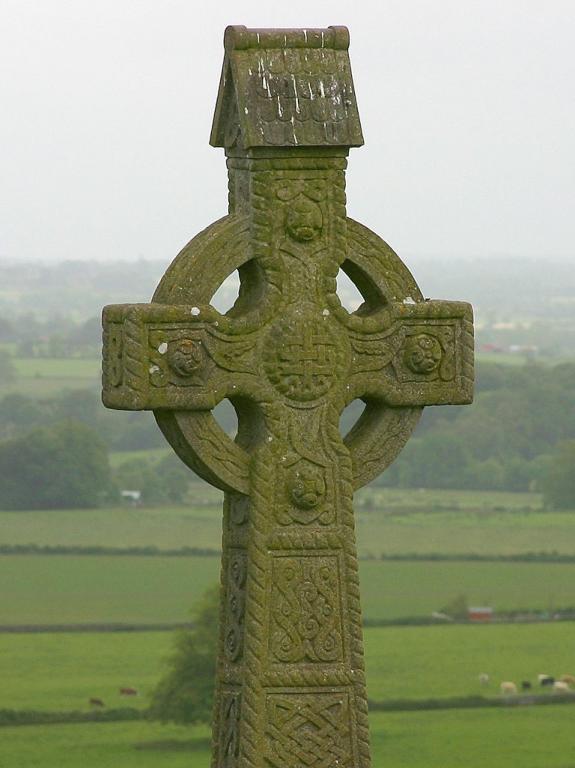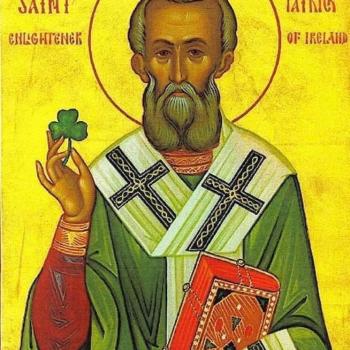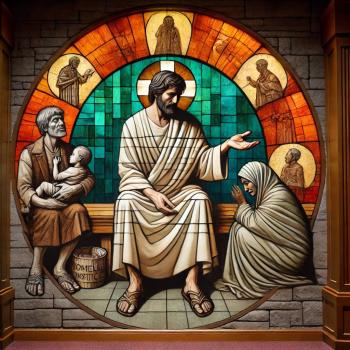Luke 15:1-32
The Parable of the Lost Sheep
15 Now the tax collectors and sinners were all gathering around to hear Jesus. 2 But the Pharisees and the teachers of the law muttered, “This man welcomes sinners and eats with them.”
3 Then Jesus told them this parable: 4 “Suppose one of you has a hundred sheep and loses one of them. Doesn’t he leave the ninety-nine in the open country and go after the lost sheep until he finds it? 5 And when he finds it, he joyfully puts it on his shoulders 6 and goes home. Then he calls his friends and neighbors together and says, ‘Rejoice with me; I have found my lost sheep.’ 7 I tell you that in the same way there will be more rejoicing in heaven over one sinner who repents than over ninety-nine righteous persons who do not need to repent.
The Parable of the Lost Coin
8 “Or suppose a woman has ten silver coins[a] and loses one. Doesn’t she light a lamp, sweep the house and search carefully until she finds it? 9 And when she finds it, she calls her friends and neighbors together and says, ‘Rejoice with me; I have found my lost coin.’ 10 In the same way, I tell you, there is rejoicing in the presence of the angels of God over one sinner who repents.”
The Parable of the Lost Son
11 Jesus continued: “There was a man who had two sons. 12 The younger one said to his father, ‘Father, give me my share of the estate.’ So he divided his property between them.
13 “Not long after that, the younger son got together all he had, set off for a distant country and there squandered his wealth in wild living. 14 After he had spent everything, there was a severe famine in that whole country, and he began to be in need. 15 So he went and hired himself out to a citizen of that country, who sent him to his fields to feed pigs. 16 He longed to fill his stomach with the pods that the pigs were eating, but no one gave him anything.
17 “When he came to his senses, he said, ‘How many of my father’s hired servants have food to spare, and here I am starving to death! 18 I will set out and go back to my father and say to him: Father, I have sinned against heaven and against you. 19 I am no longer worthy to be called your son; make me like one of your hired servants.’ 20 So he got up and went to his father.
“But while he was still a long way off, his father saw him and was filled with compassion for him; he ran to his son, threw his arms around him and kissed him.
21 “The son said to him, ‘Father, I have sinned against heaven and against you. I am no longer worthy to be called your son.’
22 “But the father said to his servants, ‘Quick! Bring the best robe and put it on him. Put a ring on his finger and sandals on his feet. 23 Bring the fattened calf and kill it. Let’s have a feast and celebrate. 24 For this son of mine was dead and is alive again; he was lost and is found.’ So they began to celebrate.
25 “Meanwhile, the older son was in the field. When he came near the house, he heard music and dancing. 26 So he called one of the servants and asked him what was going on. 27 ‘Your brother has come,’ he replied, ‘and your father has killed the fattened calf because he has him back safe and sound.’
28 “The older brother became angry and refused to go in. So his father went out and pleaded with him. 29 But he answered his father, ‘Look! All these years I’ve been slaving for you and never disobeyed your orders. Yet you never gave me even a young goat so I could celebrate with my friends. 30 But when this son of yours who has squandered your property with prostitutes comes home, you kill the fattened calf for him!’
31 “‘My son,’ the father said, ‘you are always with me, and everything I have is yours. 32 But we had to celebrate and be glad, because this brother of yours was dead and is alive again; he was lost and is found.’”
A Lost sheep, a lost coin, and a lost son. With each story, the stakes grow higher – a lost animal, lost money, and a lost child. Each more valuable than the next.
We have three yoked stories here of lost-and-found, Of the three, the parable of the lost coin is the one that seems the most out of place. The lost sheep and the lost son were both in peril for their lives whereas the coin was just lost but in no danger. Still, Jesus is hammering home a central point, a point so vital that he tells not one story but three.
All three stories end the same way: with rejoicing. The foil of all that jubilation is the sour-puss Pharisees whose abiding muttering indicates their abiding/ongoing disdain for Jesus.
Now, for just a minute, I’d like to direct your attention to what’s missing in the story of the lost son, the Prodigal Son. The mother. The sons are there, and the father, of course, but the mother and wife is missing from the story.
The thoughts, emotions and wishes of the mother didn’t matter in the culture of the time of the Bible.
So, when people say they take the Bible literally, all the time, they are saying they support war, slavery, and the marginalization of women, to the point women are invisible in stories like the Prodigal Son.
But God is bigger than the Bible. God is bigger than stories like the Prodigal Son.
When women are silenced by the culture, God is there with the women. When women are overlooked by the mainstream, God is with the women. God is with the mothers, when sons and fathers clash.
About “The Prodigal Son,” prodigal means wasteful extravagance in spending.
I’ll point out that the story of the Prodigal Son doesn’t actually include the word Prodigal. Jesus never says the word prodigal.
In verse 31 when the father replies to the older son’s lament, he does not really say, “My son” but in the Greek uses the more tender term TEKNON. A better translation would be “Child.”
Far from a gruff response, the father’s words to his older son are filled with kindness.
“Oh child, my child, just what are you talking about?”
“Child, you are always with me” Turns out, the younger son had always been “with” the father too—he was always in his heart, even when in a far country.
No matter where we go, no matter what we do, we are in the heart of God. We are formed in God’s love, we are shaped by God’s love, and we feel God’s love in us, around us, and among us.
‘This brother of yours was dead and is alive again; he was lost and is found.’
Rejoiced, what was dead has new life in God.
Rejoice. What was lost, has been found.
Rejoice, that which was gone, has come home again. Rejoice.
Rejoice, God’s grace pours out for everyone. Rejoice.
Rejoice, God raises us from the dead. Rejoice, each day is a new day to experience the love of God. Each day is a new day to embrace the love of God. Rejoice.
Rejoice. “You were dead and are alive again; you were lost and are found.” This is the love of God, this is the promise of God. Rejoice. Rejoice, rejoice.













